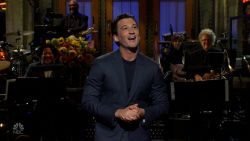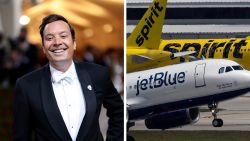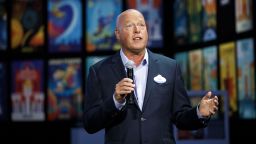Disney+ just got more expensive. Unless you’re willing to watch ads.
The Disney+ new ad-supported subscription tier will debut in the US on December 8 at a cost of $7.99 a month, the company announced on Wednesday. If that price point looks familiar, it should. That’s what consumers are paying for Disney+ right now without the ads.
The Disney+ premium tier that comes without commercials will now jump by $3 to $10.99 per month, the largest price increase for the channel since its November 2019 debut. It raised prices by $1 in March of 2021.
Disney+’s price increase comes as the service had a great quarter. The service notched 14.4 million subscribers in the third quarter, exceeding Wall Street expectations. The service currently has 152.1 million subscribers.
The results sent shares up as much as 6.5% in after-hours trading.
As for the company’s overall earnings, Disney (DIS) notched $21.5 billion in revenue for the second quarter, up 26% from last year, and reported a net profit of $1.4 billion, up 53% from a year ago.
Disney noted that it has 221 million subscribers across its multiple streaming offerings. Netflix has 220.6 million.
Disney also revised its long-term forecasts, which was 230 million to 260 million subscribers by the end of fiscal year 2024. On Wednesday, it provided a new guidance of 135 million to 165 million subscribers for its core Disney+ product, and as much as 80 million for its Disney+ Hotstar service in India.
“We had an excellent quarter, with our world-class creative and business teams powering outstanding performance at our domestic theme parks, big increases in live-sports viewership, and significant subscriber growth at our streaming services,” Bob Chapek, Disney CEO, said in the company’s letter to investors on Wednesday.
Why Disney+ is going up in price
Disney+ isn’t the only Disney streaming service that’s going up in price.
Hulu, which is majority owned by Disney, will also get a price bump, up $1 to $7.99 for its ad-supported tier and $2 to $14.99 for Hulu with no ads.
One plan that’s not getting a price hike is the premium Disney Bundle, which ties together the company’s streaming offerings of Disney+ and Hulu with no ads alongside ESPN+. Its cost remains $19.99.
This move appears to be Disney’s way of pushing consumers to sign up for its entire slate of services rather than just one. And from a pricing perspective, it’s hard to say no to a bundle that has three services that’s just $9 more per month than Disney’s largest service.
Disney (DIS) is also introducing two new bundle plans: One is Disney (DIS)+ and Hulu with ads for $9.99; the other is all three services with ads for $12.99.
Tying streaming services together looks to be a new focus of media companies.
Take Warner Bros. Discovery, for example. CNN’s parent company announced last week that it would combine its two streaming services, HBO Max and Discovery+, next summer.
If the first phase of the streaming revolution, which started around 2017, was the “Streaming Wars” the next phase could be considered the “Rumble of the Bundles.”
So why is your streaming pocketbook about to take yet another hit? It’s because building a successful streaming services is really, really expensive.
Services like Disney+ spend millions of dollars, if not billions, creating fresh content that appeals to old and new subscribers as well as for the costly infrastructure to hold it all together. Exhibit A: Disney’s loss in its direct-to-consumer unit was $1.06 billion in the third quarter — roughly four times what it was a year ago.
Streaming growth has also shown signs of maturity, i.e. slower growth. Netflix (NFLX), the king of streaming, lost subscribers two quarters in a row this year.
Across the industry, attracting new subscribers has become harder and if subscriptions are slowing down then revenue needs to come from somewhere. Raising prices is one easy way to do that.
And Disney can get away with this type of price increase considering the breadth of their library.
Disney+ is home to some of the most popular brands in all of entertainment, including Marvel Studios, Pixar, Disney Animation and Star Wars. Hulu also has feature films from 20th Century Studios and shows from FX, among other buzzy content.
Kareem Daniel, chairman of Disney media & entertainment distribution, said in a statement Wednesday that the new ad-supported offering as well as the company’s new lineup of streaming plans will “be providing greater consumer choice at a variety of price points to cater to the diverse needs of our viewers and appeal to an even broader audience.”
More than just streaming
Disney’s strong third quarter wasn’t just on the back of Disney+.
The company’s parks, experiences and products unit had a very strong quarter, bringing in revenues of $7.3 billion, up 70% over the same quarter last year.
Disney said that this was the result of “increases in attendance, occupied room nights and cruise ship sailings.”
“Our domestic parks and resorts were open for the entire current quarter, whereas Disneyland Resort was open for 65 days of the prior-year quarter, and Walt Disney World Resort operated at reduced capacity in the prior-year quarter,” the company said.


























